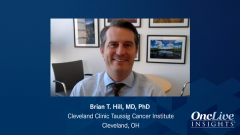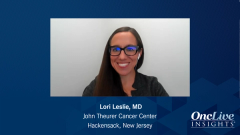
First-, Second-, and Third-Line Treatment Selection for a FL Patient Case
Dr Hill continues his discussion of the case, outlining the first-, second, and third-line treatment strategies employed for this particular patient.
Episodes in this series

Dr. Brian T. Hill: At that time because of the symptoms and the anemia, the B symptoms, and the advanced-stage disease, he was recommended to be treated. Therapy was initiated with R-CHOP chemotherapy which was administered for six cycles. He achieved a complete remission. And at the conclusion of therapy at the time rituximab maintenance was being commonly used due to its extension of remission duration. And so he was on rituximab maintenance one dose every two months as is typically given. The problem is that although many patients with this approach will have very long remissions, not everyone does. And it's difficult to predict who will or won't have short remission. In this gentleman's case, 24 months later, so about two years after completion of treatment, he had new weight loss, fever, drenching night sweats, and new fatigue as well as pruritus. He was itching. He was getting antibiotics. This is the third time over the past year he's required antibiotics for some type of infection whether it's sinus infection or pulmonary.
After having these symptoms of disease progression confirmed by PET scan, PET-CT which showed new lymphadenopathy, he was referred for a repeat lymph node biopsy to rule out transformation to diffuse large B cell lymphoma. The biopsy at the time of progression revealed still grade two follicular lymphoma. At that time he was referred for additional chemotherapy and received bendamustine-rituximab for six cycles, and maintained on rituximab for a period of time [00:09:00] afterwards. Well unfortunately after just one year, he again started developing the same symptoms of what, unintentional weight loss, the pruritus, fatigue. And a PET scan at this time confirmed disease progression. And at that time he was recommended to receive CAR-T cell therapy with axicabtagene ciloleucel.






































